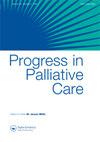培训医生提供基本水平的姑息治疗:对一种新型培训方案的评估
IF 0.9
Q4 PUBLIC, ENVIRONMENTAL & OCCUPATIONAL HEALTH
引用次数: 0
摘要
作为实现全民健康覆盖的一部分,各国政府有义务提供姑息治疗。由于COVID-19大流行给患者及其护理人员造成巨大痛苦,提供姑息治疗的义务大大增加。然而,要成功地提供姑息治疗,就需要一支受过培训、能够在各级提供姑息治疗的医疗保健队伍。尤其重要的是,能够对卫生保健工作者进行基层姑息治疗方面的培训,以扩大卫生系统提供姑息治疗的能力。本研究的目的是评估该培训计划对参与者对姑息治疗的兴趣和知识的有效性,以及他们提供基本水平姑息治疗的准备。方法:我们开发了一种新的基本姑息治疗培训计划,使用说教式和参与式学习方法,以及指导系统。该项目历时6个月。培训了38名医生。在三个时间点(训练前、训练后和训练后3个月)进行了一项调查,以评估参与者对姑息治疗的兴趣和知识,以及他们提供姑息治疗的准备情况。结果培训后患者对姑息治疗的兴趣(4.05 vs 4.24, p<0.05)和知识(83.05 vs 93.10, p<0.001)以及提供姑息治疗各方面的准备均有改善。这些改善在训练后3个月后持续。结论:采用说教式和参与式学习方法的培训计划,以及导师-被指导者系统,可以有效地培训医生提供基础水平的姑息治疗。本文章由计算机程序翻译,如有差异,请以英文原文为准。
Training physicians to provide basic-level palliative care: an evaluation of a novel training programme
Background Governments have an obligation to provide palliative care as a part of achieving Universal Health Coverage. This obligation to provide palliative care has grown significantly due to the immense suffering caused by the COVID-19 pandemic to patients and their carers. The successful delivery of palliative care, however, requires a healthcare workforce that is trained to provide palliative care at all levels. It is especially important to be able to train healthcare workers in basic-level palliative care to expand the health system’s capacity to provide palliative care. Objectives The aim of this study is to evaluate the effectiveness of this training programme on the participants’ interest and knowledge in palliative care, and their preparedness to deliver basic-level palliative care. Methods We developed a novel training programme for basic palliative care using didactic and participatory learning methods, along with a mentoring system. The programme was delivered over 6 months. 38 physicians were trained. A survey to evaluate the participants’ interest and knowledge of palliative care, as well as their preparedness to provide palliative care was conducted at 3 timepoints – pre-training, post-training, and 3 months post-training. Results Improvements in the interest (4.05 vs 4.24, p<0.05) and knowledge of palliative care (83.05 vs 93.10, p<0.001), and the preparedness to provide various aspects of palliative care were observed post-training. These improvements were sustained after 3 months post-training. Conclusions A training programme using didactic and participatory learning methods, along with a mentor-mentee system can be effective in training physicians to provide basic-level palliative care.
求助全文
通过发布文献求助,成功后即可免费获取论文全文。
去求助
来源期刊

PROGRESS IN PALLIATIVE CARE
PUBLIC, ENVIRONMENTAL & OCCUPATIONAL HEALTH-
CiteScore
2.60
自引率
11.80%
发文量
24
期刊介绍:
Progress in Palliative Care is a peer reviewed, multidisciplinary journal with an international perspective. It provides a central point of reference for all members of the palliative care community: medical consultants, nurses, hospital support teams, home care teams, hospice directors and administrators, pain centre staff, social workers, chaplains, counsellors, information staff, paramedical staff and self-help groups. The emphasis of the journal is on the rapid exchange of information amongst those working in palliative care. Progress in Palliative Care embraces all aspects of the management of the problems of end-stage disease.
 求助内容:
求助内容: 应助结果提醒方式:
应助结果提醒方式:


